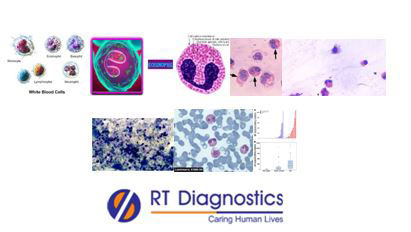Urine Eosinophil:
Why Urine Eosinophil Test?
CLINICAL INFORMATION
Eosinophils are components of WBCs that contribute to the immune system (defence mechanism against pathogens). These eosinophils fight against diseases and inflammation. Eosinophils play a predominant role in allergic reactions. At times these abnormal increases in the eosinophils can induce certain abnormalities and exacerbate (debilitating) certain pathologies. The levels of eosinophils become active when triggered by certain allergic diseases, infections and other medical conditions. The high number of eosinophils is called eosinophilia and can be seen during certain conditions like diet pills, interferons, certain antibiotics, psyllium (laxative), tranquillizers, nasal allergy or more serious forms of allergies (seasonal allergies), leukaemia, eczema, auto-immune disease, ulcerative colitis, scarlet fever, lupus, Crohn’s disease, organ transplant rejection, due to certain drug reactions, chronic inflammations and a certain type of cancers like bone marrow or lymph node cancers. An eosinophil count in a blood test measures the number of one sub-type of WBC called eosinophils. Symptoms of eosinophilia are rash, itching, diarrhoea (in the case of parasitic infections), asthma, and runny nose when associated with allergies (allergic rhinitis). Low eosinophil counts may be due to certain conditions such as alcohol abuse, and Cushing’s disease/syndrome is suspected. Even though eosinophil count is ordered by the physician in certain urogenital or genitourinary pathologies (associated with kidney, bladder, ureter etc), the presence of abnormal eosinophils indicates gross pathology, but its actual clinical utility is not yet proven significantly. Eosinophils do not appear usually in the urine. Eosinophiluria is the abnormal presence of eosinophils in the urine. The urinary sediment is extracted and Hansel stain (it is a mixture of methylene blue and eosin Y) is added to it, which is the preferred method of study under a microscope. The other method of estimation of eosinophils is by estimating the levels of eosinophil cationic protein, immunoassay etc. A urine eosinophil test is ordered in case of suspected interstitial nephritis, interstitial cystitis etc. Eosinophil counts help to screen for the diagnosis of especially - acute interstitial nephritis. Moreover, urine eosinophil counts are helpful in case of certain other pathologies including inflammation in the urogenital or genitourinary system, UTI, cystitis, prostatitis, pyelonephritis, glomerulonephritis, kidney stones, IgA Nephropathies, eosinophilic granulomatosis with polyangiitis, eosinophilic cystitis, lupus nephritis, a thrombotic acute renal failure, allergic reactions related to drugs, particularly by NSAIDs (drug-induced allergies) etc. Additional tests include test for proteinuria (micro-albuminuria), urine protein/creatinine ratio,hemoglobinuria,histopathological studies,Bence jones protein, bacteriuria etc. Other associated tests include flow cytometry, antibody blood test, bone marrow aspirate, bone marrow biopsy, cytogenic tests etc.

General Instructions:
Sample Requirement: Specimen - Urine Sample. Test Preparation: None.
NOTE - Sample for specimen collections may vary based on the patient’s condition/cases according to the patient’s presenting complaints/signs or symptoms:
SPECIMEN REQUIREMENT (Special or Rare Cases) - As instructed and guided by Physician / Clinician / Pathologist / as per Laboratory’s requirements, according to procedures and protocols.
This Multi-Specialty Clinical Referral Laboratory RT DIAGNOSTICS provides precise and accurate tests with an extensive range of testing services to the medical centres to help in the diagnosis and identification of pathology in the test specimens for infectious diseases and also to evaluate the function of organ systems of the patient. It prevents further complications and helps to stabilize and restore health to near normalcy at the earliest without delay.



